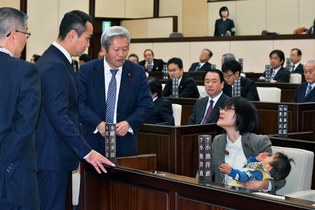 Source: www.mainichi.jp
Source: www.mainichi.jp This particular attitude in Japan is no surprise, given that the country still has woefully low levels of female participation in senior levels of government and business (coming in at 114th in gender equality rankings issued by the World Economic Forum), and the traditional image of adult female roles in society have not undergone any substantial changes in over 50 years. Recently this image was reflected in commentary by former Diet Upper House Deputy Speaker Santo Akiko (LDP), who said that the Ministry of Health and Welfare should consider bestowing an award on any women who give birth to more than 4 children. Santo allegedly claimed that while women’s working role in society was being recognized, not enough recognition was being given to housewives, and an award would rectify that imbalance.
That this came from a senior member of the LDP in itself speaks to the level of the problem facing Japanese women who wish to raise a family but want the opportunity to pursue a career. The traditional role of women dictates that once they have children, they should resign from their current role and attend to their children, and that any aspirations they might have had to develop their skills have to be sacrificed in order to ensure their children are well cared for while the husband fulfils the role of the main salary earner. While this might have been true 40 years ago, the situation is very different for young families in Japan today. Cost of living pressures, coupled with a lack of permanent, steady employment, mean that both parents must work if the family is to reach a minimum level of comfort, but since the number of full-time jobs available to women with children are few, and given the dire lack of early childhood facilities across Japan, women are forced into child rearing while their husbands must bear the burden for most, if not all, of the household costs.
This dilemma has been addressed in part by PM Abe’s push to have more women involved in the workforce and contributing to the Japanese economy, knowing full well that the lack of greater female representation in the workforce is a drain on Japan’s productivity and threatens Japan’s continued prosperity. To address this, the LDP’s election promises during the October Lower House campaign included making nursery and kindergarten free to children aged from 2 to 5, as well as making higher education (namely high school) free to lower income households.
Whether or not this can be realized, given the ever decreasing number of taxpayers from whom the government can draw the additional 10% increase to income tax to pay for the scheme, is debatable, but it at least shows that the LDP are seriously examining the issue of under-representation by women in Japanese society as a whole. Having said that, the decision by PM Abe to pledge a donation of 5.7 billion yen (US$ 50m) to Ivanka Trump’s support program for third world female entrepreneurship raised a few eyebrows, with criticism focused on the idea that if the PM was serious about supporting Japanese women’s social position, then surely such funds would be better off being spent in Japan than going overseas.
That the presence of a child in a city council chambers should raise such a fuss is difficult to comprehend for many in Western nations, especially given the advances in women’s societal roles in those nations in the past decade or more (particularly here in Australia, where Greens Senator Larissa Waters made headlines after she breastfed her new-born daughter while engaging in Senate business in the Australian Parliament). It highlights just how far women, even those in positions of power, must go in Japan to achieve even the minimum level of recognition of the circumstances that working women face and how society must adapt to those changes. To her great credit, councilor Ogata has expressed no remorse for her actions, and has used the incident to highlight the degree of bias that still exists to women playing a broader role in Japanese society. In that sense she is a pioneer, and should be commended for her actions.
 RSS Feed
RSS Feed